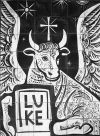
The Gospel of Luke
Bearing Fruit: Lk 12,54-13,9
The crowd is a relatively neutral audience, they are the ones who are called to make a decision. That is Jesus' aim.
Yet, wWhereas in Matthew's Gospel it is the Pharisees who are called hypocrites, here in Luke it is twice used for the crowd (12,56; 13,15). That's a stark warning against double standards, though crowds may be good at that (the mob in 18th century England for example).
In this speech, Jesus gives three teachings and then the parable:
12,54-56: Interpreting the signs of the times
12,57-59: Judging rightly
13,1-5: Call to repent:
human disaster: 13,1-3
natural disaster: 13,4-5
13,6-9: Parable - bearing fruit
Only the signs of the times and judging rightly have something similar in Matthew's Gospel (Mt 16,1-3 and Mt 5,25-26) but in quite different contexts. Effectively, this whole speech is Luke's composition.
Now return to main page.
Signs of the Times: 12,54-56
The first use of "hypocrisy" comes in verse 56 concerning the failure of the crowds to read the signs of the times when they are well able to read the signs of the weather.
Then Jesus comments (verses 57-59) on the need to respond to these signs of the times appropriately: settle up quickly . Both comments are linked by the need for right judgement which now follows (verse 57).
Judge rightly 12,57-59
Jesus' point here is to make a right assessment of a situation: it's better to resolve an issue by negotiation than the risk of a court hearing.
Matthew uses this image of the judge in the Sermon on the Mount (Mt 5,25-26) as part of a call for fraternal reconcilation. Here in Luke, the call to reconciliation is to be ready for the end. The need to decide is now, before it is too late. This prepares us for the next stage of our reading, 13,1-9.
Repent: 13,1-5
Both accidents take place in Jerusalem: sacrifices take place in the Temple and Siloam is part of the city. Jerusalem is of course Jesus' place of destiny, the end of his journey.
The general principle in the Old Testament is that if you lived faithful to God and kept his laws then you will prosper and have a long life. Tragedy is God's punishment for sin. That is the issue at the heart of the book of Job: God allows the just Job to be tempted by Satan. His friends insist he must have done something wrong, he must be a sinner. That too is the contrast between Psalm 37 (the just man never forsaken) and Psalm 73 (the prosperous wicked). In practice, bad things do happen to good people: the Galileans offering their sacrifices in the Temple when Pilate sent in the riot squad or the people under the tower when it fell. It happens that people are in the wrong place at the wrong time: now as well as then (we know nothing more about the two incidents mentioned by Jesus).
Jesus's answer is his call to repent. It is a call which follows on from what we have heard in chapter 12, the need to be always be ready and prepared (12,37). The implication of perishing is not just for this life but for eternal life. Just because people pass through this life without suffering, they should not assume that they have pleased God.
Therefore, the message of Jesus to the crowds (not just the disciples) is the call to bear fruit. The parable of the fig tree now follows (13,6-9).
Bearing Fruit: Lk 13,6-9
The three quotations from the prophets all link vines and fig trees, a sign of prosperity and well being.
The vineyard is a classic symbol for the people of God (Is 5) so traditionally God would be the owner of the vineyard.
The message is clear: there is just one more year in which to bear fruit, to repent and be ready when the Son of Man returns (12,40). The time is now.
We can return to the main page.
